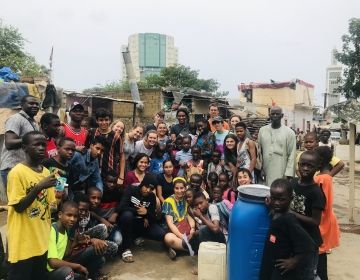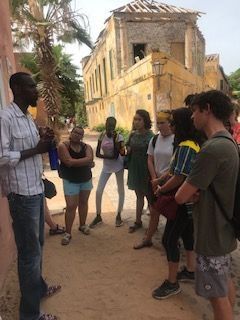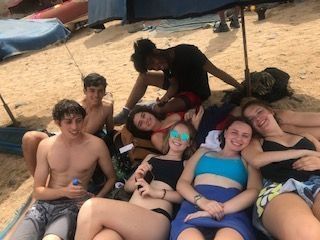Goree
It’s the 5th day in Senegal, almost a week of being immersed in a new culture. But this day was special. We were going to Goree Island in hopes of finding our roots and where it all began. We started out by meeting up at our usual meet up spot at 8:00am. Students were tired, as expected, but were still enlivened by the fact that we were going to see and learn the history of our ancestors. When we arrived at the port in Dakar, we began to sense the seriousness of this journey and how it will change our perception of a lot of ideas we had before. As we boarded the boat and left Dakar, we looked into the distance and saw a long dark island. As soon as we arrived on Goree we saw a culture of people dancing and swimming at the shore but most students were confused as to why people were celebrating when they were on an island which had once captured and sold people. We then started the tour beginning at a slave castle which was the most emotion evoking place on the island. We learned about how people were categorized and also how families were ripped apart and oppression that the children had to go through. As we walked around the castle we came to a part in which the slaves were then transported on the boat on the way to America. The name of that passageway is called “The Door Of No Return”. Students instantly began to realize why the people were celebrating on a somber place and it was just because the people are celebrating the fact that now they are safe in their own country and are free of the fear that they will one day be forced against their will to leave the place in which they’ve known their whole lives. After that the students were able to start seeing the fun part of the island in terms of art, architecture and livelihood of the spirits in people. Succeeding a long walk across the hot island, we were hungry and so we sat for traditional Senegalese food which filled us up well. We then ended our trip with a mini beach day joining the celebrating people in the water and reflected on how much of an impact this had on our minds.
Related Posts

My Senegalese Family
As I prepare to leave Senegal tonight, my thoughts turn to all the incredible people I met during my time here. Even though I will say goodbye to my fellow... keep reading
Student Perspectives: Margaret Brady
First Service at École De La Rue Yesterday we started our first service at École De La Rue, which means, school of the street. The man who created this school... keep reading
Student Perspectives: Abibatou Diarra
Day 10 is the day that multitudes of bonds were created. It started as any other day by meeting up at our designated meeting spot and discussing our observations with... keep reading

